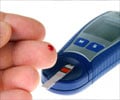Help is at hand for diabetics who have to draw blood several times a day to check on their glucose levels. A less invasive way than pricking could be around the corner.
Help is at hand for diabetics who have to draw blood several times a day to check on their glucose levels. A less invasive way than pricking could be around the corner.
Echo Therapeutics, based in Franklin, Massachusetts , is developing a wireless, needle-free transdermal continuous glucose monitoring system called Symphony tCGM for diabetics (there are nearly 24 million in the U.S.) and for use in hospital critical care units.Symphony tCGM has three basic components: a Prelude SkinPrep System—a device roughly the size and shape of an electric nose-hair clipper—that shaves away the dead outermost surface of the skin (microdermabrasion), leaving a dime-size spot; a glucose biosensor that is applied there (generally on the chest or upper back); and a wireless handheld device that reads glucose levels from the biosensor.
As the Prelude removes skin and hair that could interfere with the biosensor's reading, it passes tiny electric pulses into the skin, says Echo Therapeutics chairman and CEO Patrick Mooney. Based on the response to these pulses, the Prelude can determine when it has reached live underlying skin cells that allow the biosensor to provide a more accurate reading. The patient then applies the disk-shaped biosensor to the patch of skin prepped by the Prelude. The membrane on the biosensor's surface detects glucose as it diffuses out of the body's capillaries. The sensor contains an enzyme that reacts with the glucose and relays the indication as an electric signal. The impulse passes wirelessly to a handheld device, which records the information and monitors the readings. Each sensor can be used for two days before being replaced by a fresh one, and then either used in the same spot or another Prelude-treated location.
The only "noninvasive" glucose meter to have received U.S. Food and Drug Administration (FDA) approval is no longer on the market. In 2001 Cygnus, Inc. won FDA approval for its GlucoWatch, which was worn like a wristwatch and designed to be used in conjunction with conventional blood testing to track trends and patterns in a patient's glucose levels. The GlucoWatch administered a small electrical charge into the wrist to bring glucose to the skin surface where it could bemeasured every 10 minutes. The device, however, was discontinued in 2007 after complaints about its accuracy and that it caused skin irritation in some users.
Echo is trying to succeed where the GlucoWatch did not by improving the technology's ability to permeate a patient's skin, Robert Langer, an institute professor at the Massachusetts Institute of Technology (M.I.T.), wrote in an e-mail to Scientific American. Langer would know—the basic premise of Symphony tCGM is based on ultrasonic transdermal drug delivery technology that Echo licensed from him about a decade ago. Langer's technology focused on administering drugs without needles and even received FDA approval to administer Lidocaine cream, a local anesthetic made by Ferndale Pharmaceuticals, Ltd. With Symphony tCGM, Echo is essentially testing whether this process can safely be reversed to read blood glucose levels.
Tufts Medical Center in Boston spent several years as a clinical site testing Echo's Symphony tCGM. "We frequently during surgery take blood samples for instantaneous testing" of blood glucose levels, regardless of whether the patient is diabetic, says Michael England, the center's chief of adult cardiac anesthesia. Continuous monitoring is particularly important during surgery because patient insulin levels vary. "Regular insulin we give people during surgery could take 45 minutes to an hour to take effect," he says.
Advertisement
Beyond its potential impact on surgery and daily diabetes maintenance, England says continuous glucose monitoring might help doctors better understand insulin and how it works in the body. About 50 million people worldwide use insulin, according to the Joslin Diabetes Center in Boston.
Advertisement
style="mso-special-character: line-break">
Source-Medindia
GPL










